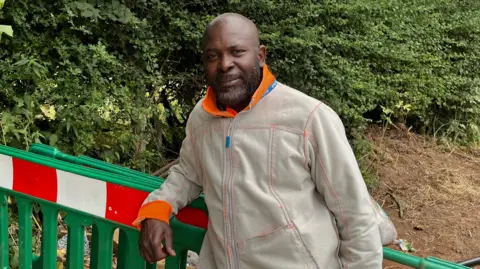 BBC
BBCThousands of people are seeking help to pay off their debts after being paid benefits by the government, only to be told they were not entitled to the money and had to pay it back.
Debt advice service Money Wellness said nearly 10,000 people sought advice last year after being told by the Department for Work and Pensions (DWP) it would take their money away.
Kevin Hylton, a crane operator from Birmingham, said the DWP had been chasing him for £13,000, despite being told he could claim Universal Credit when he was forced to take time off work due to illness.
“To be honest, I haven’t been overpaid,” he told the BBC’s Money Box programme. “They’ve just been harassing me for the last two or three years.”
After being contacted by Money Box, the DWP said it had cancelled Mr Hylton’s “overpayment” and apologised for any distress caused.
She added: “It is important that we continue to explore options to reduce fraud and errors in the social security system while supporting the most vulnerable in our society.”
But Money Wellness said the entire benefits system “needs to be simplified”.
Sebrina McCullough, its director of external affairs, said: “The system is too complicated, it’s too complex and it needs to be streamlined and that alone would prevent a lot of mistakes.”
Mr Hylton suffered a severe bout of depression during the Covid pandemic.
During that time, she applied for and began receiving Universal Credit.
But the DWP later contacted him to say that he was in fact not eligible for the benefit, so in effect they had been overpaying him and he now owed the state £13,000.
At that time, all of his benefit payments also ceased.
As well as losing her Universal Credit payments, she also lost help with rent and council tax, meaning she fell further into debt.
“There was no (electricity) inside the house because I just didn’t have any money,” said Hylton, who added that he was also forced to visit a food bank “just to get food inside the house.”
“All because of this debt that I didn’t have in the first place,” she said. “It’s been mentally exhausting, mentally stressful. It’s been endless.”
Despite all this, thanks to the help he received to deal with his depression, Mr Hylton has been back at work as a crane supervisor for the past 18 months.
However, it wasn’t until Money Box began investigating her case that she learned that she had, in fact, been eligible to receive the benefit payments in the first place.
“Until I spoke to Money Box there was no movement from the DWP,” she said. “They were adamant that it was an overpayment and that I was not eligible.”
Hylton added: “It shouldn’t take a journalist contacting the DWP to get them to put their house in order. It’s really shocking.”
 Money Wellbeing
Money WellbeingMs McCullough said that of the people Money Wellness has been supporting with excessive benefit payments, “six in 10 of them are using food bank vouchers and seven in 10 are vulnerable in some way”.
She said: “The new Labour government now has the opportunity to engage with the debt advice sector to better understand the issues we are seeing on the front line and make some changes.”
The DWP said: “Our staff work hard to support customers who are struggling to meet their payment deadlines and will always seek to negotiate sustainable and affordable payment plans.”
in a National Audit Office ReportThe DWP estimated it overpaid 6.7% (or £9.5bn) of benefit spending in 2023-24, up from £8.2bn the previous year.
It is divided into three categories:
The fraud amounted to £7.3 billion. At this point, the DWP considered that the applicant should have been aware that he was receiving money to which he was not entitled.
The claimant’s error amounted to £1.5 billion. The claimants made errors by providing inaccurate or incomplete information, not by fraudulent intent.
An official error led to overpayments worth £789m. This is an incorrect payment of a benefit due to an action, delay or incorrect assessment by the DWP, a local authority or HM Revenue and Customs.




